Houseplants with strangest leaves can transform your living space into a small wonderland. These unique plants catch the eye with their unusual shapes, colors, and patterns that go beyond the ordinary greenery.
Many of them are easy to care for, thriving indoors with just basic attention to light and water. When you grow plants with unusual foliage, you create focal points that spark conversation and add personality to your home.
Each one has a charm that highlights your plant collection and makes it more memorable. Let’s explore 26 houseplants with the strangest leaves you’ll want to add to your indoor garden.
#1. Corkscrew Rush (Juncus Effusus ‘Spiralis’)
 Source: ukhouseplants.com
Source: ukhouseplants.com
Corkscrew Rush grows in tight clumps with curly stems that twist upward in every direction. This fun plant thrives in damp soil, making it perfect for bathrooms or kitchens where humidity is high.
You can grow it outdoors in water gardens, too, but indoors it adds a whimsical touch. Place it in bright light and keep the soil consistently moist for best results.
Trim away old stems to keep the clump looking fresh. With proper care, it can live for many years and always keep its quirky shape.
#2. Seersucker Plant (Geogenanthus Poeppigii)
 Source: Plant Circle
Source: Plant Circle
The Seersucker Plant stands out with glossy leaves that ripple like fabric. It grows compact and low, perfect for shelves or small pots. Its dark-green surface with lighter stripes gives a striking contrast in dim corners.
Keep it in bright, indirect light and water regularly to maintain humidity. Wiping the leaves keeps their sheen and prevents dust buildup. It rewards you with slow but steady growth that enriches your indoor display.
#3. Wine Cup (Crassula Umbella ‘Wine Cup’)
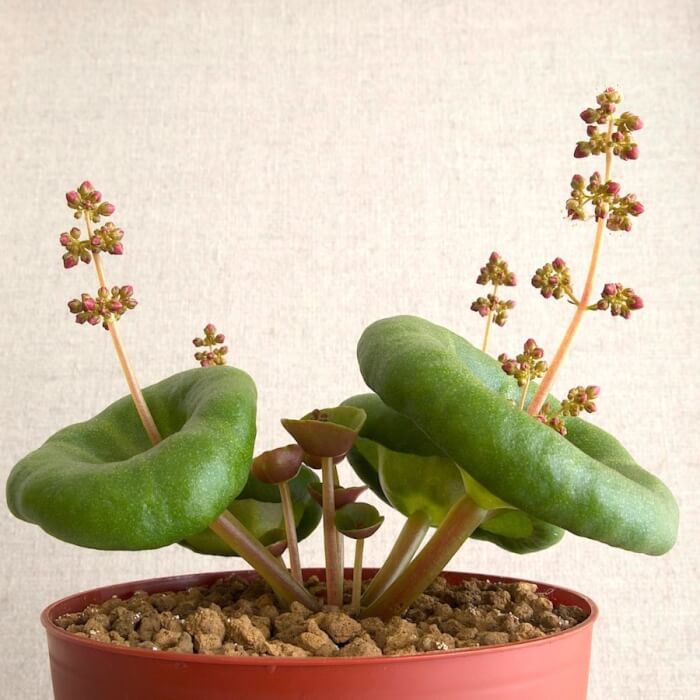 Source: Bizarre Plants – Tumblr
Source: Bizarre Plants – Tumblr
Wine Cup is a succulent with perfectly rounded leaves that resemble tiny umbrellas. The foliage forms a rosette and rises on slender stems, giving it a sculptural look. Place it in a bright spot and let the soil dry fully between waterings.
It works well in decorative pots where its structure can be admired. Use gritty soil to avoid root rot since it hates excess moisture. Over time, this plant creates a miniature forest of cup-like leaves that catch light beautifully.
#4. Heart Leaf Fern (Hemionitis Arifolia)
 Source: FAIT NOLA
Source: FAIT NOLA
Unlike most ferns, the Heart Leaf Fern produces single, shiny leaves shaped like hearts on delicate black stems. Its compact size makes it ideal for terrariums or small containers. It enjoys warmth, high humidity, and evenly moist soil.
Mist the foliage frequently to mimic its tropical origins. Keep it away from direct sun, as leaves can scorch easily. With care, it creates a romantic and unusual green accent indoors.
#5. Barbillion Echeveria (Echeveria Gibbiflora ‘Barbillion’)
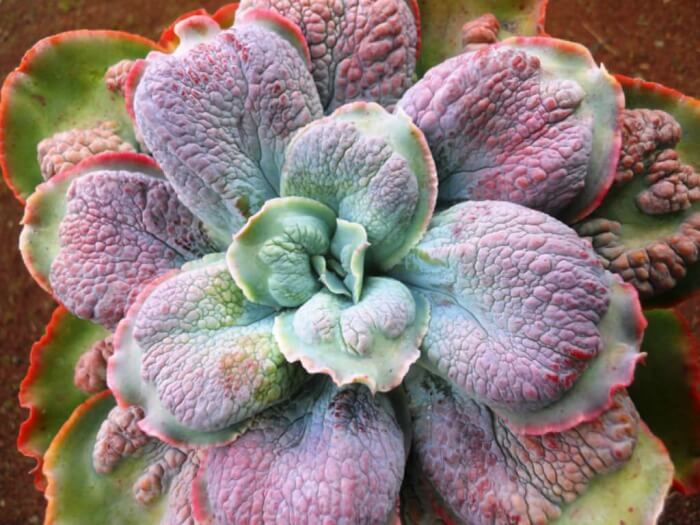 Source: Pinterest
Source: Pinterest
This large succulent has broad leaves that shift colors with the seasons. You may see shades of pink, green, and violet depending on the light and temperature. Over time, it forms a tall bare stem topped with a large rosette.
Plant it in a wide pot with sandy soil to accommodate its growth. Water only when the soil is dry, as Echeverias dislike soggy roots. The bold form makes it an excellent centerpiece on sunny windowsills.
#6. Pangolin (Crassula ‘Pangolin’)
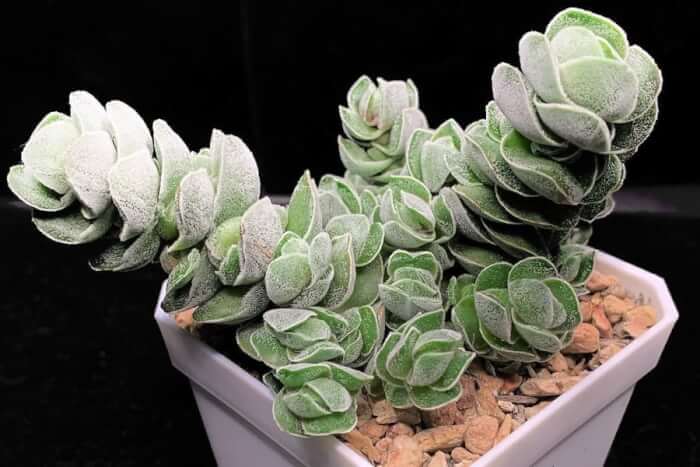 Source: Scculent Alley
Source: Scculent Alley
Pangolin features overlapping, scale-like leaves that resemble the armor of its animal namesake. It grows very slowly but produces a sculptural, column-like shape. Place it in full sun for the most intense green-gray tones.
Water sparingly and ensure the soil drains quickly. This plant looks fantastic in rock gardens or minimalist indoor pots. Its unusual form makes it a collector’s favorite.
#7. Baby’s Necklace (Crassula Rupestris)
 Source: World of Succulents
Source: World of Succulents
Baby’s Necklace stacks tiny, bead-like leaves along its stems, creating a string of plump jewels. The leaves shift from green to red when stressed by the sun or dry air. Place it in bright light to encourage this color change.
Use a small pot with sandy soil and water only when dry. Over time, the stems grow heavy and drape gracefully. It’s a playful plant that brings texture and color to your display.
#8. Jewel Orchid (Macodes Petola)
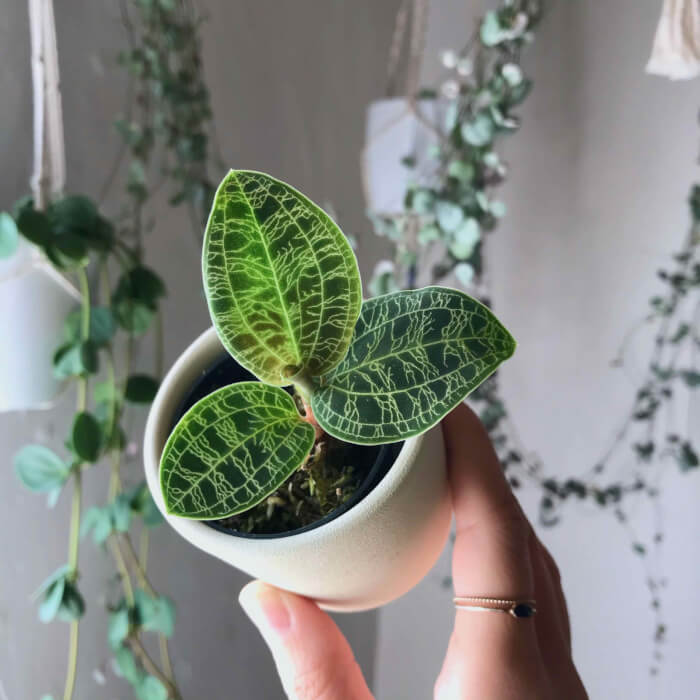 Source: HOUSEPLANTHOUSE
Source: HOUSEPLANTHOUSE
The Jewel Orchid is prized not for its flowers, but for leaves that shimmer with golden veins. The dark, velvety surface glitters when light strikes it at an angle.
It prefers low light and high humidity, making it perfect for terrariums. Water it lightly but keep the soil slightly damp.
During winter, it produces delicate white flower spikes. This orchid adds a touch of luxury to the shaded corners of your home.
#9. Marimo Moss Ball (Aegagropila linnaei)
 Source: Plantln
Source: Plantln
Marimo Moss Balls are actually algae that form into soft, green spheres. They live in water, so you can keep them in clear glass bowls or aquariums. Change the water every week to keep them healthy.
Rotate them gently so all sides receive light. Their slow growth makes them nearly maintenance-free. These living ornaments bring a calming and unique touch to any room.
#10. Striped Begonia (Begonia listada)
 Source: Plantln
Source: Plantln
Striped Begonia grows with velvety dark-green leaves and bright lime stripes down the middle. The contrast makes each leaf stand out vividly. It thrives in indirect light and evenly moist soil.
Avoid letting the soil dry out completely to prevent leaf drop. In good conditions, it also produces small clusters of white flowers. This plant brings elegance and bold design to your indoor garden.
#11. Crinkle Leaf Plant (Adromischus cristatus)
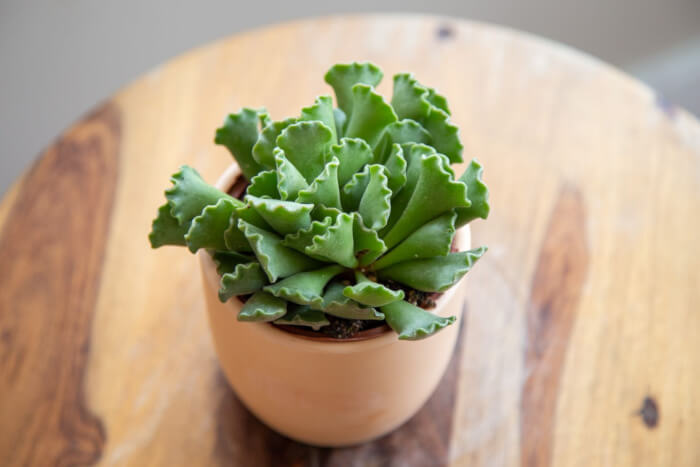 Source: The Spruce
Source: The Spruce
The Crinkle Leaf Plant has small, triangular leaves that look like they’ve been pinched at the tips. Each gray-green leaf rises upward in neat clusters, giving it a textured look.
This slow grower does well in bright light and needs soil that dries out fully between waterings. A shallow clay pot is perfect for keeping the roots healthy.
Its compact size makes it easy to tuck onto desks or windowsills. With time, the clumps grow dense and create a charming little mound of wrinkled foliage.
#12. Ant Plant (Dischidia Pectinoides)
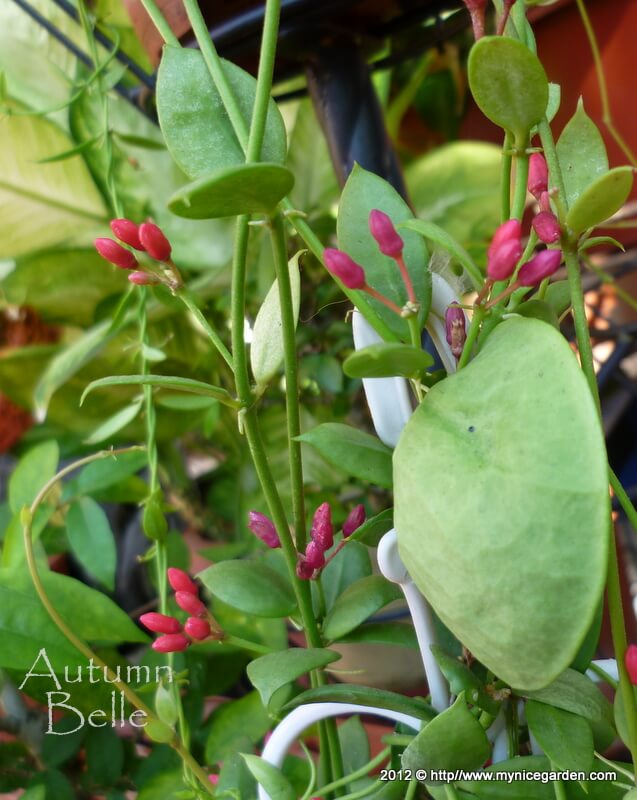 Source: My Nice Garden
Source: My Nice Garden
The Ant Plant is fascinating because it forms hollow leaves where ants sometimes live in the wild. Indoors, it still charms with its plump, pouch-like foliage. Place it in bright, indirect light and water lightly, as it prefers some dryness.
A hanging basket suits it well since the stems trail down attractively. Mist it occasionally to keep humidity levels up. This rare plant adds both beauty and intrigue to your collection.
#13. Spotted Begonia (Begonia Amphioxus)
 Source: Plantly
Source: Plantly
This begonia has long, pointed leaves marked with vivid red spots and edges. The unusual patterns give it a wild, almost painted look. It likes bright but indirect light and evenly moist soil.
If kept too dry, the leaves may crisp, so water when the top inch feels dry. Tiny pink flowers often appear throughout the year, adding even more interest. It’s one of the most striking foliage plants you can grow indoors.
#14. Vietnam Ferox (Begonia Melanobullata)
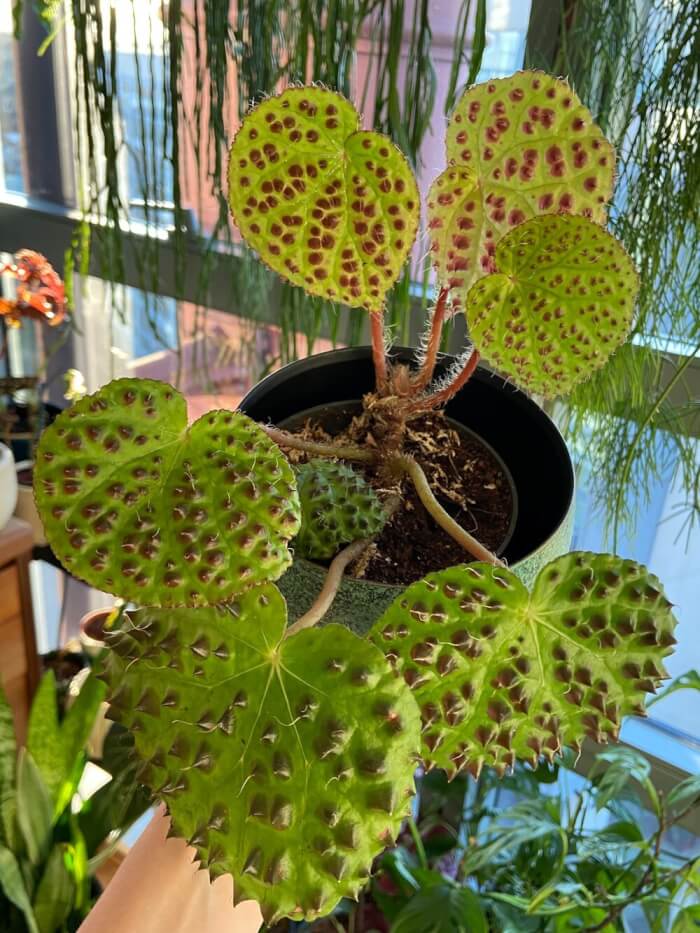 Source: Lya Solis
Source: Lya Solis
Vietnam Ferox is unlike any other begonia, with green leaves covered in raised, black bumps. Each bump is soft to the touch and tipped with tiny colored hairs. The plant thrives in high humidity, so keep it in a terrarium or mist it often.
Use well-draining soil to prevent root issues. Under the right conditions, it grows lush and full, showing off its rare texture. This one is a true conversation starter.
#15. Parachute Plant (Ceropegia Sandersonii)
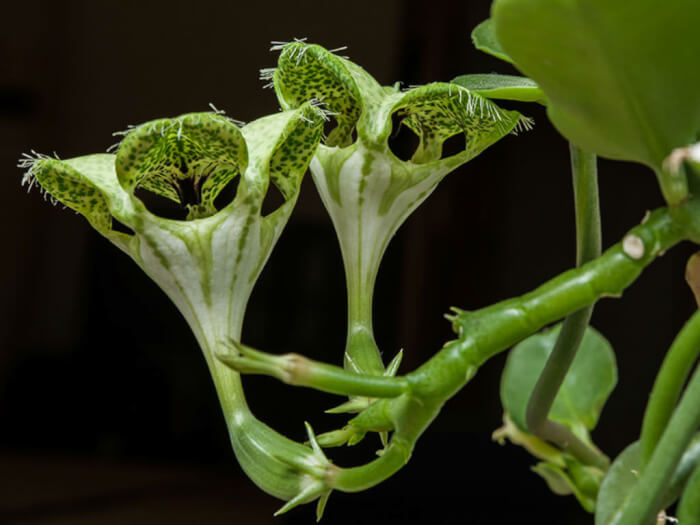 Source: World of Succulents
Source: World of Succulents
The Parachute Plant trails slender stems lined with heart-shaped leaves. At the tips, it produces unusual green and white flowers shaped like little parachutes. It enjoys plenty of indirect sunlight and regular watering, but never soggy soil.
A hanging basket lets its vines cascade gracefully. Trim occasionally to encourage fuller growth. If you want something playful and surprising, this vine is a perfect choice.
#16. Leopard Plant (Farfugium Japonicum)
 Source: Gardenia.net
Source: Gardenia.net
Leopard Plant gets its name from its large, glossy leaves speckled with yellow spots. The bold pattern brightens any shady corner and looks dramatic in pots. It prefers moist soil and partial shade indoors.
Avoid letting it dry out too much, as the leaves will wilt quickly. In mild winters, it can even bloom with daisy-like yellow flowers. This plant brings a bold tropical vibe into your home.
#17. Spiralis Cactus (Cereus Forbesii ‘Spiralis’)
 Source: Groovy Plants Ranch
Source: Groovy Plants Ranch
The Spiralis Cactus twists upward in a spiral, making it one of the most unusual cacti. Its ribbed stems carry small spines, but the shape is what captures attention. Place it in full sun and water sparingly during the growing season.
In summer, it may reward you with large pink-white blooms. A sturdy pot with sandy soil keeps it happy. Over time, it grows tall and sculptural, like living art.
#18. Starfish Cactus (Stapelia Grandiflora)
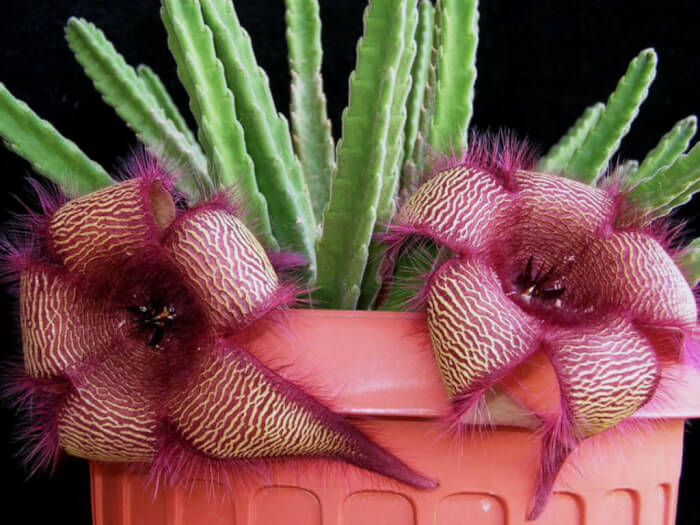 Source: Houseplant Central
Source: Houseplant Central
This succulent grows thick, green arms that sometimes blush red in sunlight. The real show, however, is its enormous star-shaped flowers. While the blooms are beautiful, they carry a strong odor in nature to attract pollinators.
Indoors, they’re still impressive but may be best admired outdoors when flowering. Keep the soil dry between waterings and provide bright light. Its dramatic size and unique flowers make it unforgettable.
#19. Jellyfish Air Plant (Tillandsia)
 Source: Between The Folds UK
Source: Between The Folds UK
The Jellyfish Air Plant isn’t just a plant; it’s a display idea. When an air plant is tucked inside a sea urchin shell and hung upside down, it looks like a floating jellyfish.
These low-maintenance plants don’t need soil and only require a soak in water once a week. Place them in bright, filtered light for steady growth.
They’re perfect for hanging displays in kitchens, bathrooms, or near windows. It’s a playful way to bring a touch of the ocean indoors.
#20. Butterfly Wing Plant (Christia Obcordata)
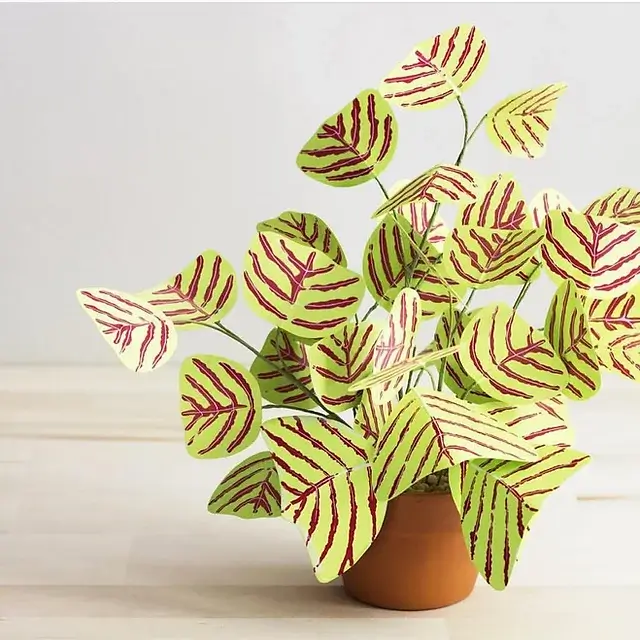 Source: Pilea.com
Source: Pilea.com
Butterfly Wing Plant is named for its leaves, which look like tiny wings patterned with green and burgundy stripes. The triangular foliage spreads outward, creating a delicate effect. It thrives in partial shade and well-draining soil.
Water lightly and keep the soil just damp enough to prevent wilting. Its patterned leaves make it look like a living piece of art. Add it to your collection if you want something graceful and uncommon.
#21. Hurricane Cactus (Lepismium Cruciforme)
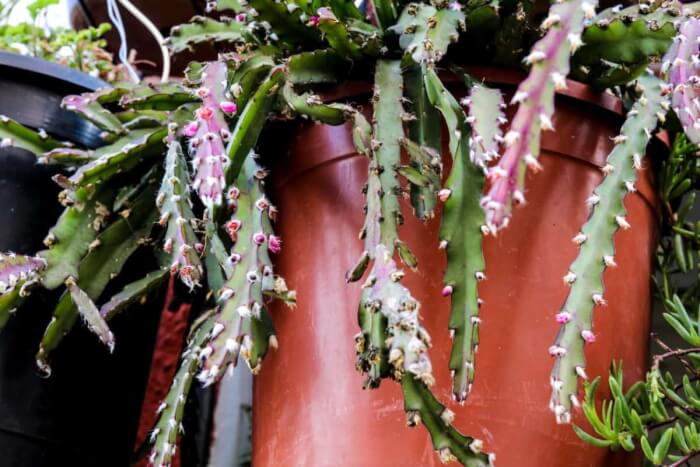 Source: Sublime Succulents
Source: Sublime Succulents
Hurricane Cactus grows in long, branching stems that twist and tumble like green ribbons. The plant drapes beautifully from hanging pots, making it a standout for indoor displays.
It prefers bright, indirect light and thrives in a warm room with moderate humidity. Water sparingly, letting the soil dry before watering again.
The trailing stems create a dramatic cascade that can fill empty corners with living texture. With patience, you might even see delicate blossoms appear along its stems.
#22. Trachyandra (Trachyandra)
 Source: Teak And Terracotta
Source: Teak And Terracotta
Trachyandra is a rare succulent with whimsical, curling leaves that look like green spirals springing from the soil. Each rosette seems almost sculpted, adding a playful touch to your collection.
It grows best in bright light with sandy, well-drained soil. Water lightly and avoid letting moisture sit around the roots. This plant stays compact, making it perfect for tabletops or shelves. Its quirky look will always spark conversation.
#23. Alocasia Stingray (Alocasia Macrorrhiza ‘Stingray’)
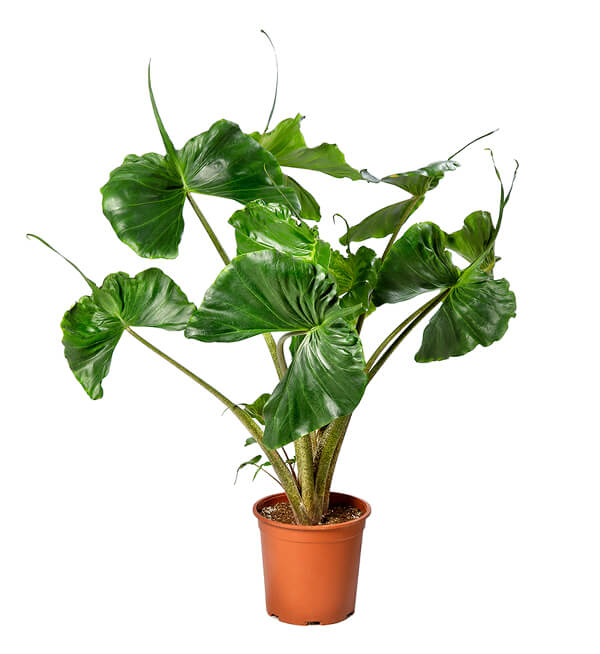 Source: Evanthia
Source: Evanthia
The Alocasia Stingray has glossy green leaves that mimic the shape of stingrays gliding through water. Each leaf has a long, tail-like tip, making it one of the most unique alocasias. Place it in bright, indirect light with evenly moist soil.
It appreciates high humidity, so misting or a pebble tray works well. With proper care, it grows tall and lush, becoming a bold statement plant. It brings a touch of the tropics right into your living room.
#24. Chinese Jade (Sinocrassula Yunnanensis f. Cristata)
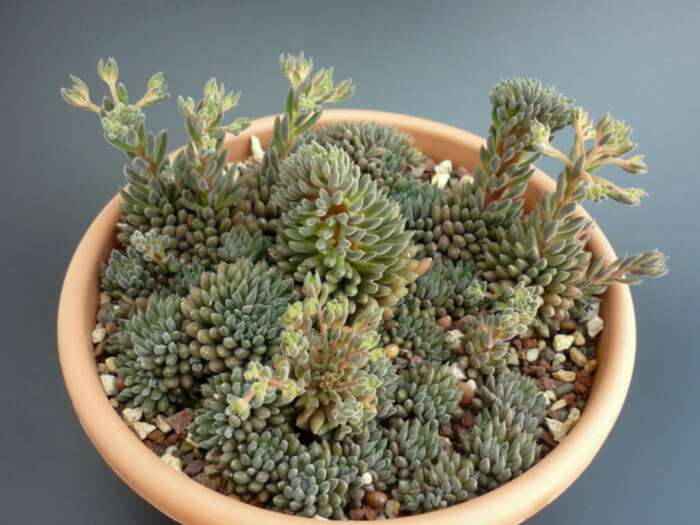 Source: World of Succulents
Source: World of Succulents
Chinese Jade looks like a cluster of tiny hedgehogs thanks to its spiky, compact rosettes. The dark green leaves are packed tightly together, forming unusual mounds. This succulent thrives in bright sunlight and minimal water.
A gritty soil mix will keep its roots healthy. Over time, it develops into striking little clusters that make excellent accents for windowsills. Its rugged appearance hides how easy it is to grow indoors.
#25. Cooperi Haworthia (Haworthia Cooperi)
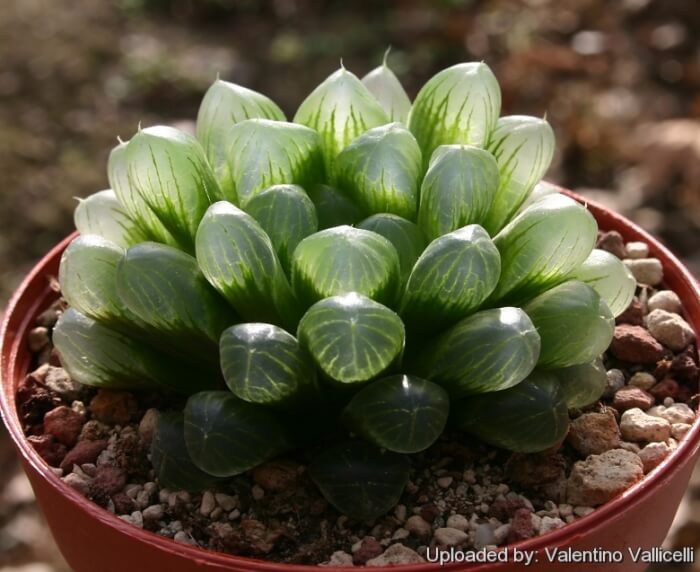 Source: LLIFLE
Source: LLIFLE
Cooperi Haworthia is adored for its plump, translucent leaves that look like drops of jelly. These small rosettes grow in tight clusters and stay compact, making them perfect for small pots.
Keep them in bright but filtered light and water only when the soil dries out. Their see-through leaf tips almost glow when backlit by the sun. With minimal care, they can thrive for years. It’s a true gem for succulent lovers.
#26. Venus Flytrap (Dionaea Muscipula)
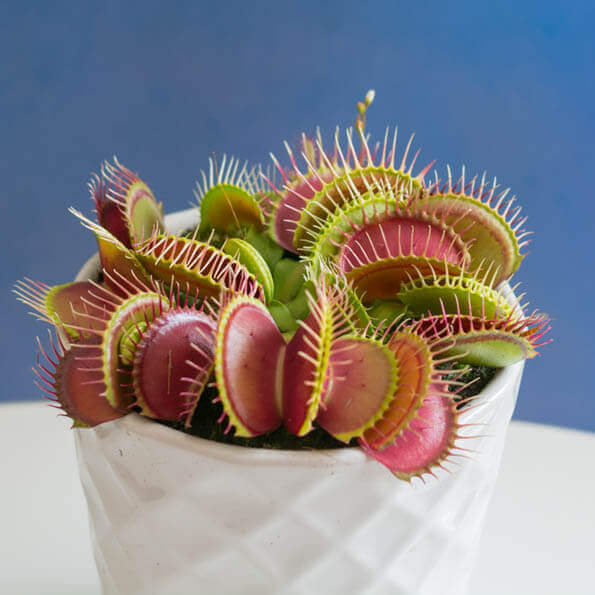 Source: OurHouseplants.com
Source: OurHouseplants.com
The Venus Flytrap is perhaps the most famous carnivorous plant, with leaves that snap shut when triggered. Each trap has tiny hair-like sensors that close around unsuspecting insects.
For best growth, give it bright light and keep the soil consistently damp with distilled water. Avoid feeding it human food, as insects are all it needs.
Watching it in action can be fascinating and fun. With care, this plant can live for many years as a natural curiosity in your home.
